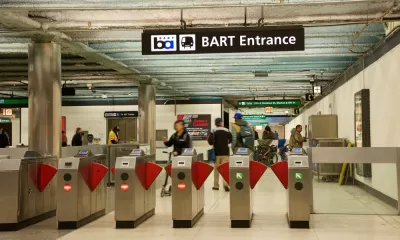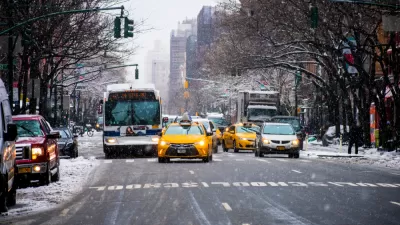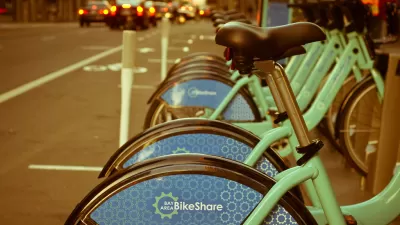San Francisco and New York exemplify the political challenges in finding long-term finding solutions for public transit in the post-pandemic United States.

“Across the country, transit agencies that depend heavily on fare revenues face a “fiscal cliff” in the near future when federal pandemic aid runs out,” according to an article by Daniel C. Vock for Route Fifty. “Ridership on these systems (and, therefore, fare revenues) have not returned to pre-pandemic levels.”
Citing the San Francisco and New York regions as the leading examples of transit systems struggling to make ends meet while facing a “fiscal cliff,” and seeking solutions that would generate more revenue for transit while charging more for the use of cars (a proposed bridge fee recently came up short in the legislature in California, while New York is continuing to face obstacles in implementing congestion pricing through a cordon system in Manhattan).
But both California and New York are trying other solutions to the transit fiscal cliff as well. “Lawmakers [in the state of New York] agreed to dedicate $1.1 billion a year from payroll taxes to help fund the MTA. They also promised a share of the licensing fees from an anticipated casino in the city, and added a one-time payment of $300 million.”
California’s solutions were less comprehensive, according to Vock: “transit advocates had to fight to avoid cuts in state support that [Gov.] Newsom originally proposed. The governor and lawmakers had to make up for a $32 billion anticipated deficit, about a 10th of the size of the state’s annual budget. Ultimately, lawmakers found $5 billion statewide through 2025 to stave off cuts to bus and rail service. But $4 billion of that is capital money that transit agencies can now use for operations.”
As noted by Planetizen coverage in recent years, the fiscal crisis facing public transit was only temporarily relieved by the massive federal stimulus bills approved since 2020, but the underlying issues facing transit persist in 2023. As noted by Vock, San Francisco and New York City are not the only cities facing the fiscal cliff brought about the pandemic.
Across the country, many other transit systems face similar financial predicaments. In the Washington, D.C., area, subway and bus operator WMATA faces an operating deficit of $750 million starting next summer. Transit agencies in the Chicago area warn that they will soon face a $730 million shortfall on their own. New Jersey Transit could see shortfalls of $1 billion.
More details can be found at the source article below, but public transit as we have known in the United States, even with the shortcomings inherent to co-existing in a car-centric planning era, is still at risk several years after Covid-19 arrived in North America.
FULL STORY: Transit agencies scramble to piece together funding as ‘fiscal cliff’ looms

Planetizen Federal Action Tracker
A weekly monitor of how Trump’s orders and actions are impacting planners and planning in America.

Congressman Proposes Bill to Rename DC Metro “Trump Train”
The Make Autorail Great Again Act would withhold federal funding to the system until the Washington Metropolitan Area Transit Authority (WMATA), rebrands as the Washington Metropolitan Authority for Greater Access (WMAGA).

The Simple Legislative Tool Transforming Vacant Downtowns
In California, Michigan and Georgia, an easy win is bringing dollars — and delight — back to city centers.

Supporting Cycling Takes More Than Just Bike Lanes
Safe, protected bike lanes are a key part of a city’s bike infrastructure — but secure parking, e-bike charging, and other amenities can also influence people’s shift to cycling.

Judge Blocks Anti-DEI Rules for Transportation, Housing Grants
A second injunction blocks the Trump administration from enforcing new regulations for federal funding.

Unhoused People in San Jose Could Face Arrest if They Refuse Shelter
A policy proposed by the city’s mayor would give law enforcement the option to arrest homeless residents if they refuse three offers of housing.
Urban Design for Planners 1: Software Tools
This six-course series explores essential urban design concepts using open source software and equips planners with the tools they need to participate fully in the urban design process.
Planning for Universal Design
Learn the tools for implementing Universal Design in planning regulations.
Smith Gee Studio
City of Charlotte
City of Camden Redevelopment Agency
City of Astoria
Transportation Research & Education Center (TREC) at Portland State University
US High Speed Rail Association
City of Camden Redevelopment Agency
Municipality of Princeton (NJ)





























